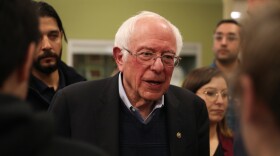With a little more than a month to go until the New Hampshire primary, two leading Democratic presidential candidates have kicked off the new year campaigning in the state. Massachusetts Sen. Elizabeth Warren and Pete Buttigieg, former mayor of South Bend, Indiana, competed for voters’ attention there Thursday.
Julián Castro, the former secretary of housing and urban development in the Obama administration, ended his campaign the same day. His departure makes the field for the Democratic presidential nomination a bit less crowded, but the race still has four apparent front-runners. The other two, former Vice President Joe Biden and Vermont Sen. Bernie Sanders, campaigned in the Granite State just before the start of 2020.
Speaking at a town hall in Keene, Buttigieg asked voters to imagine America after President Trump leaves the White House.
“The challenge will be to implement big enough, bold enough ideas to meet that moment,” Buttigieg told several hundred people who filled the historic Colonial Theater in Keene. “And to figure out how to do it in a way that can unify a dangerously divided American people. That is the kind of president that I am running to be.”
The latest polls, including one from WBUR last month, suggest Buttigieg is leading in New Hampshire. And as a front-runner, he is now answering sharper questions, like: How does a 37-year-old former mayor of a small city make the case that he is equipped to be president?
“I think it’s about talking about judgments and values and how that sits alongside that experience,” Buttigieg told reporters. “It’s about making sure I’ve explained my experience. There are very senior senators in our country who never in their life have managed more than 100 people.”
Buttigieg’s message is decidedly moderate; he talks about bringing people together, rather than waging political revolution. It has made a believer out of voters like George Rodriguez from East Longmeadow, Massachusetts.
“This country does need to be united [and] I think he can do that,” Rodgriguez said. “I think his policies are all framed that way as well. I think that’s the approach because if you go way too far to the left, you’re not going to be electable, and I’m scared [of] what that might bring.”
Earlier in the day, at a town hall event in Concord, Warren began 2020 the same way she began 2019, calling for “big structural changes.” Among them is a wealth tax on the super-rich to fund a series of programs for working Americans – from universal childcare and preschool to college debt relief. In a clear reference to her moderate rivals — such as Buttigieg and Biden — she warned that if Democrats try to play it safe, “then Democrats will lose.”
“We win when we have big enough ideas to meet the big problems in people’s lives, and we get out there and fight for them,” she said.
That message helped propel Warren toward the front of the pack through last summer and early fall, but in recent weeks, she’s slipped in the polls, and her fundraising appears to have slowed as well.
Meanwhile, the Sanders campaign says it took in more than $34 million in the final three months of last year – the largest haul of any Democrat. The Warren campaign is expected to announce its fourth quarter total Thursday, but last week it told supporters that it was lower than hoped.
“I think Elizabeth Warren is boxed in right now,” said Dante Scala, a political science professor at the University of New Hampshire. “She’s boxed in by the continued success of Bernie Sanders for the progressive vote. So Sanders represents something of a road block for Warren.”
He added that Buttigieg represents another obstacle by attracting highly educated white voters who might otherwise have gone for Warren. But Scala believes the race remains unsettled and unresolved.
In a profound way, what Buttigieg and Warren presented this week in New Hampshire is the big question Democratic voters are trying to answer: whether it’s better to embrace big progressive change or a more moderate approach in the name of unity.
This article was originally published on WBUR.org.
Copyright 2020 WBUR







